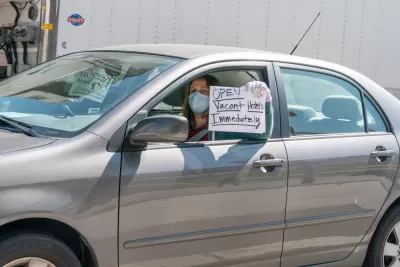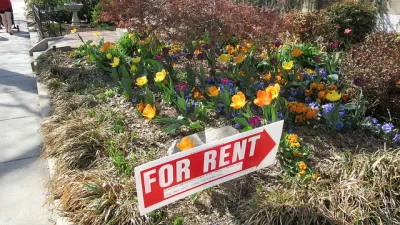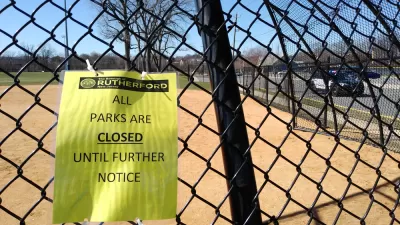Six regional and state housing advocates discuss the connections between uprisings over racial injustice, the pandemic, and the need for housing security.

The COVID-19 pandemic is similar in many ways to more regional natural disasters. One of the ways it is similar is that its consequences are falling more heavily on Black and Brown people, but the relief on offer is often not reaching, or best serving, those who need it most. Soon after COVID-19 took hold, Andreanecia Morris of Housing NOLA saw a national Katrina unfolding, and reached out to some of her fellow state and regional housing advocates who understood the racial equity dimension of housing work and the pandemic to strategize with each other about how to respond to this moment and build a better foundation for housing work going forward. Shelterforce spoke with the group on a video call about how they understand the importance of this moment, what’s happening in their states, and their vision for a better way forward.
Miriam Axel-Lute: How are your organizations—or your members, if you’re a membership organization—interacting with, responding to, or participating in the responses to the police violence and the uprisings that are going on?
Andreanica Morris: I’m with Housing NOLA in New Orleans. It’s been interesting to live through this new moment where we finally said, “Enough is enough” when it comes to systemic racism. We were already dealing with the results of systemic racism because of the disproportionate effect that COVID-19 was having on African Americans and Latinos, the more vulnerable populations. And then, you add to it the unfortunate murder of, not one, not two, but three: while what happened to George Floyd certainly lit the match, it goes without saying that Breonna Taylor’s murder and Ahmaud Arbery’s murder certainly also contributed. And then the fact that Breonna Taylor’s murder isn’t even being classified as a murder.
That speaks to the heart of the housing issue, because it’s a racialized and gendered issue. Poor Black women with “too many children” is the image that is conjured [by “affordable housing.”] It’s a huge impediment to getting the work done.
We have been continuing our work because we know that one of the things that’s necessary to end systemic racism is that communities are actually strong.
Sixty percent of our annual city budget is spent on “public safety,” in a city with an affordable housing crisis. Almost half the people who lived here pre-COVID can’t afford to live here, [there’s] almost a 20 percent unemployment rate because of COVID-19, and we’re still prioritizing “public safety.” Louisiana still happens to be the mass incarceration capital of the world. So where we have obvious proof that this isn’t working, we’re still leaning on it. Education has been defunded, public health has been defunded, and housing has never been a huge priority.
So, [the response] is invigorating. It makes you somewhat optimistic, in a very strange way, because there is still hope. And it also feels a little bit naïve.
...
FULL STORY: Racial Equity, Housing, and COVID: A Roundtable

Planetizen Federal Action Tracker
A weekly monitor of how Trump’s orders and actions are impacting planners and planning in America.

Congressman Proposes Bill to Rename DC Metro “Trump Train”
The Make Autorail Great Again Act would withhold federal funding to the system until the Washington Metropolitan Area Transit Authority (WMATA), rebrands as the Washington Metropolitan Authority for Greater Access (WMAGA).

The Simple Legislative Tool Transforming Vacant Downtowns
In California, Michigan and Georgia, an easy win is bringing dollars — and delight — back to city centers.

The States Losing Rural Delivery Rooms at an Alarming Pace
In some states, as few as 9% of rural hospitals still deliver babies. As a result, rising pre-term births, no adequate pre-term care and harrowing close calls are a growing reality.

The Small South Asian Republic Going all in on EVs
Thanks to one simple policy change less than five years ago, 65% of new cars in this Himalayan country are now electric.

DC Backpedals on Bike Lane Protection, Swaps Barriers for Paint
Citing aesthetic concerns, the city is removing the concrete barriers and flexposts that once separated Arizona Avenue cyclists from motor vehicles.
Urban Design for Planners 1: Software Tools
This six-course series explores essential urban design concepts using open source software and equips planners with the tools they need to participate fully in the urban design process.
Planning for Universal Design
Learn the tools for implementing Universal Design in planning regulations.
Smith Gee Studio
City of Charlotte
City of Camden Redevelopment Agency
City of Astoria
Transportation Research & Education Center (TREC) at Portland State University
US High Speed Rail Association
City of Camden Redevelopment Agency
Municipality of Princeton (NJ)





























